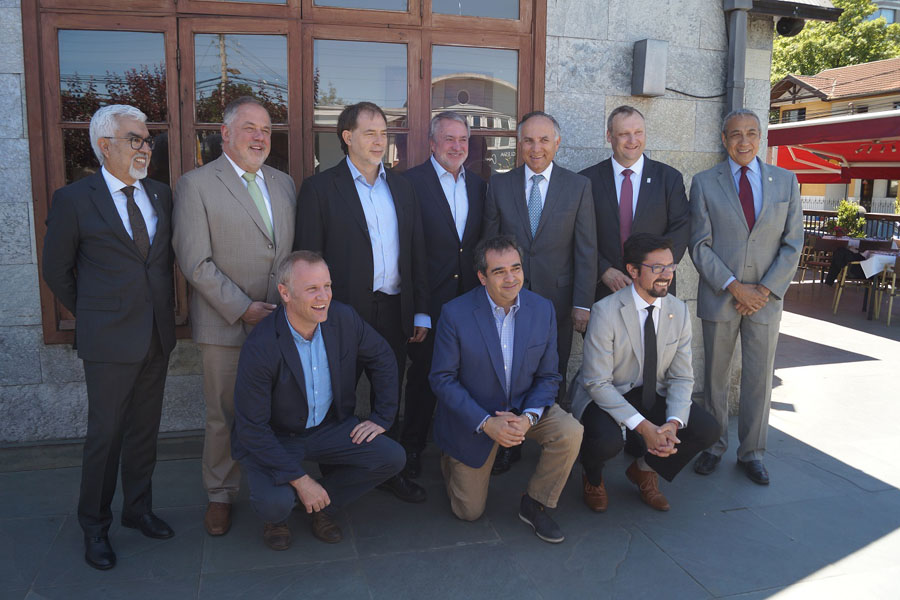|
The Congress will bring world-level experts together in Temuco, on January 16, 2019. |
More than three hundred people are expected to come to Temuco to attend this year’s version of the Congress of the Future in the Araucanía Region (“Congreso Futuro Araucanía 2019”). Four world-renowned speakers will give interesting master classes in this event, which is organized by the Senate of the Republic of Chile with support of the regional universities and the municipal government, on January 16, at the La Araucanía Pavilion. The event, which will be replicated in ten regions of the country, has turned into a reference at the Latin-American level and the world-level and therefore, according to Guido Girardi, the senator and president of the Committee Challenges of the Future, it is very important that the regions can invite scientists from more advanced countries to Chile. He added: “Humanity, the citizens and politics are having a mayor challenge these days: we are illiterates regarding the irruption of technology and the ecological crisis we are living in, and that is why it is important to act. It is essential to bring politics and science together, the universities and the citizens, in order to discuss together. The Congress of the Future seeks to be a space where our intellectual leaders, our universities, which are the most important centers of thoughts, can be the main actors.” The mayor, Jorge Atton, said that this event is very important for the Araucanía Region: “The fact that the universities that have their head offices in our region are working together is very essential.” An opinion the rectors of the other universities also share. Aliro Bórquez of the Universidad Católica of Temuco affirmed: “It is very important to motivate these young people regarding research and science. We are convinced that this is the key for the development of our region. The Araucanía Region is a big natural laboratory and offers them great opportunities.” The rector of the Universidad de La Frontera, Dr. Eduardo Hebel, said: “We, the universities, have to work together on projects, from a scientific point of view. Associativity is the future of science in the future, which will hold strong results in the sense of being able to provide our regional community with the results of our research.” Teodoro Ribera is the rector of the Universidad Autónoma de Chile. He emphasized the role the senator Girardi and the mayor Atton have had regarding the needs of the Araucanía Region and the relevant topics for the future. “The university does not only train human resources, but also researches, plans and helps. This region cannot keep being involved in the conflict we are having today. We have to strengthen partnerships and fraternity. In this region, no one is dispensable. It does not matter where you come from, what matters is where you want to go. I think that this region wants peace, wants development, and that has to be a joint effort, something we build from day to day.” CONFERENCES IN TEMUCO The congress includes four conferences on volcanology, the cities of the future, and astronomy. One of the speakers is Clive Oppenheimer, a British volcanologist, professor of volcanology at the University of Cambridge, and filmmaker. His research fields are volcanic processes and dangers, and the consequences for nature and society regarding major eruptions in the past. He spent thirteen field seasons studying Mount Erebus in Antarctica. His contributions are each time more a nexus of natural science, arts and humanities. He made the film “Into the Inferno” (Netflix 2016) together with Werner Herzog. Javier Villar Ruiz will hold another conference. He is a Spanish architect, associate and Design Chief at Kengo Kuma & Associates (KKAA), with broad experience from projects in Spain, Brazil, Japan, South Korea, Belgium, Switzerland, France and Hungary. At the moment, he is working on the construction of the Olympic Stadium, which will be the venue of the Olympic Games in Tokyo in 2020. Another conference will be held by Catherine Cesarsky, a top-level advisor in astrophysics for the French Alternative Energies and Atomic Energy Commission (CEA). Among other international activities, she is Chair of the SKA board of directors, which is building the biggest radio telescope in the world to explore the universe. Her conference in Temuco will be about “The evolution of galaxies according to observations at ALMA and ESO”. And the fourth speaker is Adele Plunkett, an astronomer at Yale University. She has been working for the European Southern Observatory (ESO) and the Atacama Large Millimeter Array (ALMA) in Chile. She is a researcher at the National Radio Astronomy Observatory (NRAO) in the USA since 2018 and is working on an astronomical project at ALMA in the north of Chile. Her fields of research are star formations and her studies include the observation of young stars with radio telescopes. In the conference, she will talk about the privileges of Chile in this field and about the solar eclipses in Coquimbo and the Araucanía Region in Chile in 2019 and 2020. In parallel, there will be scientific recreational activities offered by Explora Conicyt, the Science Communication Center of the Universidad Autónoma de Chile and researchers of the Universidad Católica de Temuco. The congress will also be transmitted via online streaming by the different institutions involved.
Escrito por: Communications Team
Congreso Futuro Araucanía 2019 |





